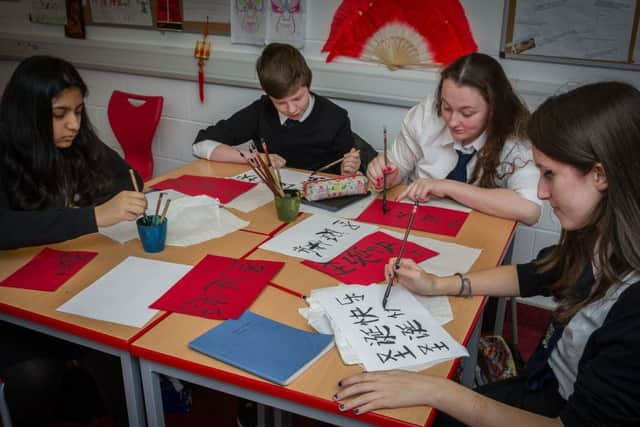Ruth Davidson: SNP dithers over education as Higher pass rate falls
Listen carefully this morning: from the smallest village to Scotland’s great cities, you should be able to make out the gentle sound of a mass sigh of relief. The long summer break is over. Parents no longer need fret about how to fill the days of their various teenage darlings. Less audibly, I suspect parents will also be offering teachers and schools a silent vote of thanks for taking on the job.
Those schools opening their gates today after a well-earned summer break will, for the most part, approach that task with zeal, passion and ambition for their pupils.
Advertisement
Hide AdAdvertisement
Hide AdAlmost all will be well led by dedicated headteachers with a clear sense of vocation. And the vast majority of teachers will continue to do a fantastic job in increasingly difficult circumstances.


They are being asked to pick up more and more, with expectations from families and society always on the up. The schools I visit in my constituency in Edinburgh Central and elsewhere in Scotland never cease to impress me. They are an absolute credit to the country.
But the question facing the education system as teachers and pupils go back today is whether the education system they work under is up to scratch.
Scottish education is continuing to undergo radical reform in the guise of the Curriculum for Excellence, “the most significant development in Scottish education since the War”, according to one of its founders, educationalist Keir Bloomer.
Yet, as those same experts acknowledge, it is almost impossible to know whether it’s working. No baseline exists to let us know.
At the same time, the SNP Government has scrapped annual surveys of literacy and numeracy, making it even harder to evaluate standards. Last week’s exam results were described as “stable” by Education Secretary John Swinney.
The trend, however, is a gradual fall in the Higher pass rate from 79.2 per cent in 2015 to 76.8 per cent this year.
Meanwhile, the last few days have raised fresh concerns about a decline in the standards of Highers, and in the number of subjects students can choose – with, for example, huge declines in the number of pupils taking modern languages.
Advertisement
Hide AdAdvertisement
Hide AdThe SNP’s response to this has appeared confused. Last year, we were told an Education Bill would be introduced to turn schools around. It would be the most radical change to the way schools were run since devolution.
The Scottish Conservatives were happy to discuss these plans in the hope of finding a consensus. Yet – apparently fearful of the politics of asking for support – the SNP then abruptly dumped the bill earlier this summer.
Quite what happens next is anybody’s guess. Where there was once talk of education being the SNP’s “number one priority”, now we see drift and dither.
Nobody is pretending it is easy to transform and improve our education system. But there are some small steps that could be taken in the coming months which might push things in the right direction.
We could start by bringing more accountability and clarity to the system so we know where we stand. This means getting the balance right. Let me do something radical for a Scottish Conservative leader and agree with the Educational Institute of Scotland.
Yesterday, its general secretary Larry Flanagan called for assessments for Primary 1 children to be scrapped, following a growing rebellion from teachers.
The Scottish Conservatives have opposed these P1 tests from the start. That view is shared across the political divide on the opposition benches. So the SNP should act – and scrap them without delay.
However, that is only one side of the coin. The other side is for the SNP to reverse its decision to take Scotland out of international surveys of literacy and numeracy so we can get a clearer picture of how we stand.
Advertisement
Hide AdAdvertisement
Hide AdWe need genuine standardised tests later in school so we can see how pupils are progressing. And we should also commission an independent research body, to monitor and assess Curriculum for Excellence so – finally – parents might stand a chance of understanding what it’s about.
And on top of this, the SNP needs to up its game on teacher recruitment and retention. At First Minister’s Questions last September, I raised the case of Trinity Academy in Edinburgh after it was forced to ask parents for help teaching maths.
I was told it was all being sorted. But while those individual posts have now been filled, figures published by the Scottish Conservatives today reveal that no fewer than 231 schools across Scotland start the year today advertising for teaching posts – with one school alone advertising for seven jobs. That’s on top of the thousands of teaching posts that have been scrapped in the last 10 years.
Here’s one obvious way forward to add to the ideas already proposed, such as TeachFirst: last year, the Scottish Parliament’s cross-party Education Committee concluded more should be done to attract additional teachers from elsewhere in the UK.
Despite some changes, the system still throws up too many barriers to well-qualified teachers coming to Scotland. That only deters teachers from picking up their profession when they come here.
As the committee concluded, we should be more flexible so teachers from England, Wales or Northern Ireland know they are welcome. Surely that is better than having classrooms but not enough teachers to fill them.
Rightly, Nicola Sturgeon said two years ago that education was her number one priority. Rightly, she said this was what she wanted to be judged by. She needs to live up to her rhetoric – or the verdict will not be kind.
